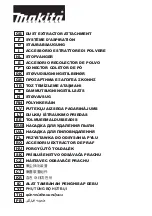
Page 6
RULES FOR SAFE OPERATION (Continued)
■
BEFORE MAKING A CUT, BE SURE THE DEPTH
AND BEVEL ADJUSTMENTS ARE TIGHT.
■
USE ONLY CORRECT BLADES. Do not use blades
with incorrect size holes. Never use blade washers or
bolts that are defective or incorrect. The maximum blade
capacity of your saw is 5-1/2 inches (140 mm).
■
NEVER touch the blade or other moving parts during
use.
■
NEVER start a saw when its blade is touching the
workpiece.
■
NEVER lay a tool down before its moving parts have
come to a complete stop.
■
SAVE THESE INSTRUCTIONS. Refer to them
frequently and use them to instruct others who may use
this tool. If you loan someone this tool, loan them these
instructions also.
WARNING:
Some dust created by power sanding, sawing, grinding,
drilling, and other construction activities contains
chemicals known to cause cancer, birth defects or
other reproductive harm. Some examples of these
chemicals are:
• lead from lead-based paints,
• crystalline silica from bricks and cement and other
masonry products, and
• arsenic and chromium from chemically-treated lumber.
Your risk from these exposures varies, depending on
how often you do this type of work. To reduce your
exposure to these chemicals: work in a well ventilated
area, and work with approved safety equipment, such
as those dust masks that are specially designed to filter
out microscopic particles.
SAVE THESE INSTRUCTIONS







































